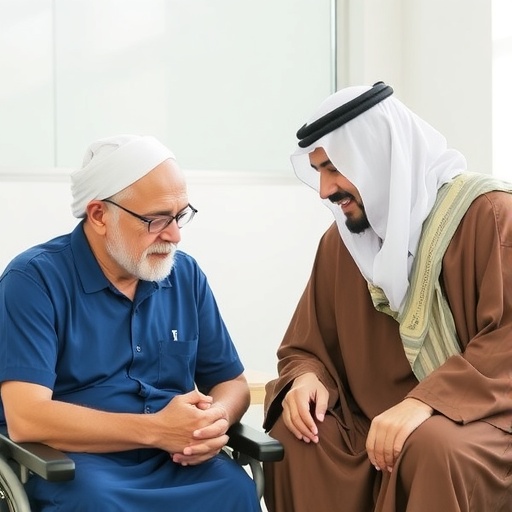In a groundbreaking study set in the United Arab Emirates (UAE), researchers have turned the spotlight onto a crucial but often overlooked component of rehabilitation for children with intellectual disabilities: fathers’ involvement. This study, recently published in BMC Psychology, challenges societal norms and brings to the forefront the nuanced realities of paternal engagement in the care and developmental rehabilitation of children facing intellectual challenges. By focusing on fathers’ self-reported involvement, the investigation offers unprecedented insights into both the emotional and practical dimensions of their participation within a traditionally conservative cultural context.
Intellectual disability, characterized by significant limitations in intellectual functioning and adaptive behavior, profoundly affects children’s development and integration into society. Rehabilitation efforts typically involve a multidisciplinary approach, combining medical, educational, and psychosocial strategies tailored to the child’s unique needs. However, the role of family dynamics, especially paternal influence, remains insufficiently explored. The UAE, with its fast-evolving healthcare and social frameworks, presents a unique case where traditional family roles intersect with modern rehabilitation practices, making it an ideal setting for such a study.
Fathers’ involvement in child rehabilitation is more than a measure of their physical presence; it embodies emotional support, active participation in therapeutic activities, and decision-making regarding care. The study meticulously compiled self-reports from fathers engaged with children diagnosed with intellectual disabilities to capture the depth and breadth of their involvement. Findings suggest that while cultural factors may restrict overt paternal engagement in certain public health scenarios, many fathers demonstrate considerable commitment behind closed doors, actively supporting therapy regimens and educational interventions.
The researchers deployed a mixed-methods approach combining quantitative surveys with qualitative interviews, which allowed them to extract both statistical trends and personal narratives. The quantitative data revealed patterns of involvement linked to socioeconomic status, educational background, and the father’s own psychological well-being. Remarkably, higher educational levels correlated with increased paternal participation in rehabilitation activities, indicating that awareness and understanding significantly empower fathers to engage effectively.
Cultural expectations emerged as a strong influencing factor in paternal roles. In many families, mothers traditionally assume primary caregiving responsibilities, often limiting fathers’ direct engagement. Yet, the study highlights evolving attitudes among younger generations, with many fathers expressing willingness and a sense of duty to be more involved. This dynamic shift suggests potential for systemic change in rehabilitation programs which could actively incorporate fathers as pivotal participants rather than peripheral figures.
The research also delved into psychological barriers that fathers face, including feelings of inadequacy, social stigma, and emotional stress related to their child’s condition. These factors often inhibit proactive involvement despite genuine desire to help. Mental health support tailored for fathers could thus be a critical adjunct to rehabilitation services, helping to alleviate these barriers and enhance the overall effectiveness of care.
Technological advancements and tele-rehabilitation platforms, increasingly adopted in the UAE’s healthcare system, provide novel opportunities for engaging fathers remotely. Digital tools facilitate flexible participation, enabling fathers to learn therapeutic techniques and track progress from home. The study discusses how integrating fathers into telehealth sessions could amplify their role, balancing traditional family responsibilities with contemporary healthcare delivery.
An intriguing dimension explored is the impact of paternal involvement on child outcomes. Children whose fathers reported higher engagement generally exhibited better adherence to rehabilitation protocols and improved social functioning, underscoring the therapeutic value of active paternal support. Through mechanisms such as modeling behavior, emotional bonding, and reinforcing skills learned during therapy, fathers significantly contribute to children’s developmental trajectories.
The implications for policy and practice are substantial. Healthcare providers are encouraged to design rehabilitation programs that explicitly include fathers, with culturally sensitive training and outreach initiatives. Workshops, support groups, and father-focused counseling can normalize involvement and equip fathers with the necessary skills and confidence. Institutions must recognize fathers as key stakeholders in the rehabilitation ecosystem.
Moreover, the study’s findings advocate for broader community education to dismantle stereotypes linking caregiving exclusively to mothers. Public awareness campaigns highlighting the essential role of fathers could foster more inclusive attitudes and motivate paternal participation. Social support networks should also be expanded to connect fathers with peers undergoing similar experiences, mitigating isolation and reinforcing positive engagement.
From a neurodevelopmental standpoint, the emphasis on fathers enriches our understanding of how family environments contribute to neurological plasticity in children with intellectual disabilities. Engagement by multiple caregivers can stimulate diverse sensory and emotional inputs critical for brain development. The study raises compelling questions about optimal family-centered interventions and how paternal attributes intersect with child neurobiology and rehabilitation potential.
The research landscape remains ripe for further exploration. Longitudinal studies tracking paternal involvement and child outcomes over extended periods could illuminate causative pathways and refine intervention models. Additionally, comparative analyses across different cultures would enhance comprehension of universal versus culturally contingent aspects of paternal roles.
In conclusion, this pivotal study urges a paradigm shift in the rehabilitation of children with intellectual disabilities in the UAE and beyond. It reframes fathers not merely as supporting actors but as active agents capable of transforming therapeutic experiences and outcomes. By dismantling barriers, fostering knowledge, and valuing paternal perspectives, healthcare systems can harness the full potential of family dynamics to enhance the lives of countless children facing intellectual challenges. As societies evolve, embracing and empowering fathers will be integral to creating equitable, effective, and compassionate rehabilitation landscapes worldwide.
Subject of Research: Fathers’ self-reported involvement in the rehabilitation of children with intellectual disability in the United Arab Emirates
Article Title: Children with intellectual disability: fathers’ self-reported involvement in rehabilitation in the United Arab Emirates
Article References:
Mohamed, A., Opoku, M.P., Almarzooqi, S. et al. Children with intellectual disability: fathers’ self-reported involvement in rehabilitation in the United Arab Emirates. BMC Psychol 13, 813 (2025). https://doi.org/10.1186/s40359-025-03086-0
Image Credits: AI Generated




